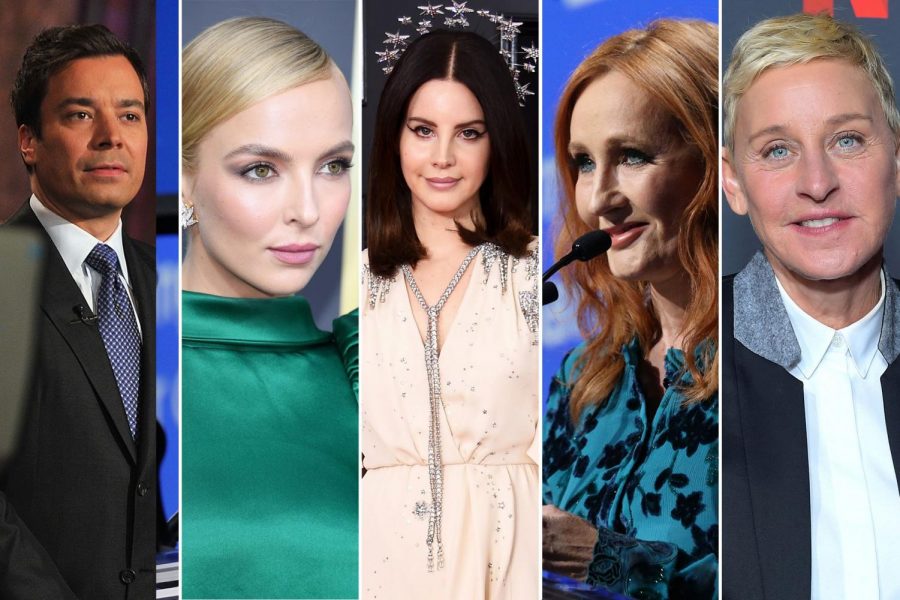Should We Be Concerned About Cancel Culture?
March 17, 2021
In the past year, practically everyone has heard the term ‘canceled,’ and it seems at least once a month, a major celebrity is called out on social media for some offense and is subsequently canceled. From PewDiePie to Ellen DeGeneres to J.K. Rowling, there are endless examples of celebrities facing intense backlash and criticism in response to their words or actions. But what does canceling even mean, and does it do more harm than good?
According to Nicole Holliday, an assistant professor of linguistics at the University of Pennsylvania, the term ‘cancel’ is “used to refer to a cultural boycott…. It just means ‘I’m not going to put my attention or money or support behind this person or organization because they’ve done something that I don’t agree with.'”
Many view ‘canceling’ as a method to hold public figures accountable for their offensive words and actions, especially regarding sensitive topics such as racism, sexism, homophobia, xenophobia, islamophobia, and antisemitism. In an ideal world, this concept allows the general public to de-platform someone or call out his/her wrongdoing if they feel this person has made a significant mistake. But in reality, ‘cancel culture’ is much more flawed;it has transformed into a extreme and dangerous aspect of society that overly punishes people for their errors instead of allowing them to grow and learn.
“I like the idea of being able to take away someone’s platform and call out something wrong,” said senior Noah Kaplan. “However, more often than not, cancel culture becomes too extreme and does not let anyone learn from their mistakes.”
Senior Gabrielle Goldman holds similar beliefs, as she thinks that cancel culture “has been an effective way to educate individuals and hold them accountable for their actions, however, sometimes it can be taken too far. If someone has truly shown that they have learned from their mistakes, I think it is important to give them the chance to grow and become a better person.”
Depending on the severity of their wrongdoing, celebrities may experience anything from lost followers to canceled contracts and sponsorships. Last November, TikTok stars Charli and Dixie D’Amelio were harshly criticized for “being rude” to their personal chef in a video on their family channel, critiqued for their table manners and attitudes throughout the video. Many viewers felt that the girls were disrespectful to the chef who served the family traditionally-prepared paella, a dish that includes snails. Although their actions in the video did not warrant intense backlash, the sisters were viciously attacked online which caused Charli to temporarily lose over a million followers.
Whether you are a die-hard ‘Charli stan’ or someone who doesn’t even use TikTok, it is obvious that some poor table manners in a harmless video should not be used as a rationale to ‘cancel’ anyone. If ‘cancel culture’ has become our method of punishment to address people’s miniscule mistakes, then holding people accountable for significant reasons will lose all of its value and merit. It therefore counterreacts the very purpose of ‘canceling’ someone.
“I think cancel culture has evolved into something dangerous, even though it may have become popular due to good intentions,” commented one Wayne Hill senior. “While people want to call out others for their wrongdoings, cancel culture has stripped away the notion that people can change for the better. I think the world would be a much better place if we focused less on cancelling a person for their past and more on showing them how their actions were harmful so that they don’t make the same mistakes again.”
Recently, The Bachelor’s Chris Harrison was canceled for criticizing ‘cancel culture’ itself. He is now experiencing incredibly harsh repercussions due to a racism controversy involving current Bachelor contestant Rachael Kirkconnell. Harrison announced he was “stepping aside” from his long tenure as the host of the ABC franchise. During the airing of this season of the Bachelor, TikTok user @feministmama called out Kirkconnell for liking an Instagram photo with a woman wearing a MAGA hat, pictures of her wearing an American Indian costume, and social media posts in support of law enforcement. Most damaging, however, were the resurfaced photos that showed her attending an Antebellum-themed fraternity party at a plantation in 2018 wearing Old South attire.
First and foremost, this theme is extremely inappropriate and offensive, and I agree with all of those who criticize and condemn these types of displays. However, we have to consider that Kirkconnell was only 18 at the time, and may not have fully understood that this event was wrong. Additionally, she was given no chance to respond to these critiques before she was completely attacked on social media. It is perfectly okay for people to call her out for previously participating in these events, as they are disrespectful to the POC community, but is one distasteful college party enough to ‘cancel’ her? What about the thousands of other people who have attended similar types of parties – should they be canceled too? It is difficult to justify this type of ‘cancel culture’ when it is selective with its targets.
If Kirkconnell was the one under fire, then why was Chris Harrison also ‘canceled?’ When discussing Kirkconnell’s controversy with Rachel Lindsay, the franchise’s first black Bachelorette, Harrsion said, “I haven’t heard Rachael [Kirkconnell] speak on this yet, and until I actually hear this woman have a chance to speak, who am I to say any of this? I saw a picture of her at a sorority party five years ago, and that’s it. I’m not defending Rachael —I just know that 50 million people did that in 2018. That was a type of party that a lot of people went to.”
He continued: “My guess? These girls got dressed and went to a party and had a great time. They were 18-years-old. Does that make it okay? I don’t know, Rachel [Lindsay], you tell me…but where is this lens we’re holding up and was that lens available and were we all looking through it in 2018?”
After these comments, Harrison received instant backlash from Bachelor Nation and other social media users. After releasing an initial apology, he announced he would be distancing himself from the network, and has additionally been replaced for the next seasons of The Bachelorette. Many interpreted Harrison’s words as defending the racist “Old South” party theme, but he never endorsed this type of event or defended Kirkconnell. Instead, he questioned people’s rash response to these photos – offering some perspective as to whether this party theme was under the same scrutiny in 2018 as it is in 2021. Whether you agree or disagree with Harrison’s comments, it seems extreme to boot him from his long-tenured show for questioning the nature of ‘cancel culture.’
Senior Hazel Hinners said, “I believe that it is always necessary for people to be held accountable for their mistakes and that these things shouldn’t be overlooked, except cancel culture is often very selective with who they chose to cancel, which demerits the entire system.”
However, this growing “anti-cancel culture’ sentiment is paving the way for extremists like Marjorie Taylor Greene – whose supporters cry ‘toxic cancel culture’ to defend her racist, sexist, transphobic, and other offensive actions and words. Although ‘canceling’ people has become a dangerous weapon on social media, public figures still need to be held accountable for malicious and hateful comments. By ‘canceling’ people for minor wrongdoings, we diminish our ability to de-platform actually dangerous and harmful people.
Hinners further commented, “I think cancel culture is the toxic embodiment of society’s nature to make extreme judgments and rash decisions. Ultimately, when people are cancelled, it’s usually for the wrong reasons or it never lasts, and the people who should be cancelled aren’t even called out to begin with. Cancel culture should be about accountability and holding people responsible, but has become something centralized around hatred, and can be very damaging to those on the receiving end.”
While ‘canceling’ may have begun as a good-intentioned way to create consequences for those in power, it may be time that we cancel ‘cancel culture.’



![Rakim’s celebration with attorney upon hearing not guilty verdict [Courtesy of NBC News]](https://whhspatriotpress.com/wp-content/uploads/2025/04/Rocky-aint-guilty.webp)



